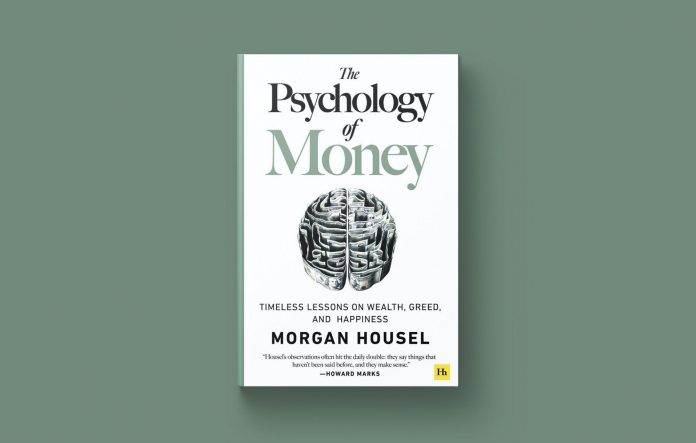“Morgan Housel is not that typical personality that preaches about personal finance from the perspective of “expert slash motivational speaker.” He doesn’t make a sales pitch for some one-size-fits-all formula to get rich, like what most of the so-called finance gurus are offering.
Instead, he is a market guy who understands the complex dynamism of trading/investing, who is obsessed with behavioural finance as the reasoning for market movements and/or business growth, who explains that our relationship with money is not science or maths but dopamine and cortisol, it is fear and greed, it is pride and envy and social comparisons, or in short our relationship with money is actually psychological.
Right from the start Housel remarked that doing well with money actually has little to do with how smart we are and a lot to do with how we behave. And behavior is not easy to teach, even to really smart people. He then added, “a genius who loses control of their emotions can be a financial disaster. The opposite is also true. Ordinary folks with no financial education can be wealthy if they have a handful of behavioral skills that have nothing to do with formal measures of intelligence.”
Hence, the unbelievable story of Ronald Read at the beginning of the book, a janitor who gave away $6 million to the local hospital when he passed away, in contrast with Richard Fuscone, a Harvard MBA and former Merrill Lynch executive who lost almost everything at the end of his story. This, in essence, is what the book is about, the good approaches towards money that can be implemented even by the janitor (that we should emulate), and the bad ones even by the likes of the Harvard-educated executive (that we should avoid).

And the first thing that we need to understand is that everyone is different. We have different personalities, different childhood backgrounds, different education, different goals, and thus it is only natural that we have different risk tolerances and attitudes towards money, saving and investment. For example, baby boomers that grew up in the Great Depression era will have a different attitude towards risk and reward compared with millennials who live under a low inflation low-interest rate environment.
Another important point in the book is that tails drive everything. There are around 15 billion lives that were born between the 19th and 20th century but imagine 7% of them were never born, such as Adolf Hitler, Joseph Stalin, Mao Zedong, Gavrilo Princip, Thomas Edison, Bill Gates, and Martin Luther King. Or imagine the last century without the small percentage of occurrences such as the Great Depression, World War 2, The Manhattan Project, Vaccines, Antibiotics, September 11th, and the fall of the Soviet Union. The point is, a small percentage of people or events create the most impacts in history.
The same concept also occurs in investing. As Housel describes, since 1980 the Russell 3000 index has increased more than 73-fold, which is a spectacular return. However, if we look closer, 40% of the companies in the index were effectively failures, while the 7% of components performed extremely well and were more than enough to offset the flops. And there is more. Within the most performing companies in the market there are even more tail events. In 2018, Amazon alone drove 6% of the S&P 500 returns, while Amazon’s growth itself was almost entirely thanks to Amazon Prime and Amazon Web Services, while others such as Fire Phone and travel agencies have failed.
This is also where Housel emphasized the importance of “batting average”, that it is ok to have small losses here and there as long as the wins can more than compensate for the whole performance. This approach is valid for money and any other functions in life.
Moreover, in this immensely informative book in just 183 pages, there are many more lessons on the psychology of money that helps to frame and re-frame our mindsets, such as the relationship between luck and risk, the magic of compounding, the difference between fees and fines, how historical trends are not prophecies, how optimistic-pessimistic outlooks can influence our decision makings, and one important mindset that rarely discussed by any other commercial personal finance books: the importance of contentment.

Because ultimately, Housel concluded, “wealth is what you do not see. Wealth is the nice cars not purchased. The diamonds were not bought. The watches were not worn, the clothes forgone and the first-class upgrade declined. Wealth is financial assets that have not yet been converted into the stuff you see.”
Indeed, the aim of this book is not to sell the author’s service, but it is to give us the complete psychological understanding of our relationship with money, and how to have a better attitude towards it. And for that reason, this book offers a fresh perspective in an already saturated personal finance industry. Which is why this is one of the most influential books that I have ever read.”
In summary:
- When making money decisions, beware of your limited knowledge and experience.
- Focus on broader ideas and patterns instead of specific individuals and their actions.
- Train and remind yourself to be content, there are things not worth risking.
- Long term steady investment can give compounding returns.
- Be optimistic about the future, being paranoid about things that can affect that future.
- Apply the principle of stop-loss to your life.
- Use money to control your time. That is freedom.
- Be humble, kind and empathetic. It will bring respect.
- Don’t spend money on things you don’t need. Save money.
- Being reasonable rather than trying to be coldly rational gives us peace of mind.
- Plan ahead. But also think about what happens when the plan goes wrong.
- Beware that you and everyone around you will change over time.
- Every decision has a price that you should be ready to pay.
- Before any comparison and decision making, make sure that both sides are playing the same game!
- Avoid extreme decisions since things can change.

Top 10 Lessons from the Book – The Psychology of Money
- Less ego, more wealth.
- Manage your money in a way that helps you sleep at night.
- If you want to do better as an investor, the single most powerful thing you can do is increase your time horizon.
- Become OK with a lot of things going wrong. You can be wrong half the time and still make a fortune.
- Use money to gain control over your time.
- Save. Just save. You don’t need a specific reason to save.
- Define the cost of success and be ready to pay it.
- Worship room for error.
- Avoid the extreme ends of financial decisions.
- You should like risk because it pays off over time.
I would like to end with two quotes from the book:
The premise of this book is that doing well with money has a little to do with how smart you are and a lot to do with how you behave. And behaviour is hard to teach, even to really smart people.
I love Voltaire’s observation that “History never repeats itself; man always does.” It applies so well to how we behave with money.



